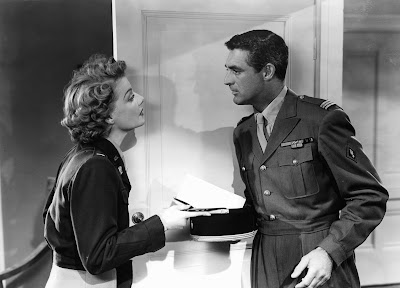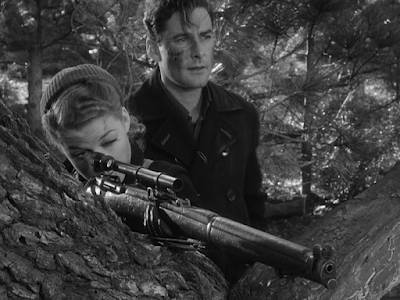 I Was a Male War Bride (Howard Hawks, 1948) Hawks doing what he does best in a comedy—taking the finely chiseled speci-man that is Cary Grant and reducing him to a frustrated, humiliated wreck, robbing him of everything—dignity, decorum, manhood and sleep...mostly sleep.
I Was a Male War Bride (Howard Hawks, 1948) Hawks doing what he does best in a comedy—taking the finely chiseled speci-man that is Cary Grant and reducing him to a frustrated, humiliated wreck, robbing him of everything—dignity, decorum, manhood and sleep...mostly sleep.In this one, Grant plays a Belgian in the French Army (in the same way he plays an American...as Cary Grant) in post-war Germany (it's actually based on a memoir—"I Was an Alien Spouse of Female Military Personnel en route to the United States Under Public Law 271 of the Congress" by the fellow this happened to) trying to break a black market operation with the help (and frequent hindrance) of Ann Sheridan. They have history and start out loathing each other. Along the way, he suffers bumpy rides in a motorcycle sidecar—in a rainstorm, no less—is nearly vaulted and scrunched by a barricade, paddles on the brink of a waterfall, climbs a pole (only to find that the sign, in German, says "Wet Paint"), is knocked off an awning from the second floor of a hotel, tossed in jail, and, in general, is made to suffer every indignity known to Man.
War is Hell, with several levels of humiliation, and its an everyday occurrence in this man's (and this woman's) Army. If it's not a battle of the sexes. its a battle with bureaucracy, or the everyday battle with being a stranger in a strange land. It is constant frustration, and Grant, outwardly so unflappable, is the master of its comic opposite (as evidenced by such Hawks-Grant pairings as His Girl Friday, Bringing Up Baby, and the non-Marx Monkey Business. Grant was the perfect test-subject for emasculation and the break-down of the cool customer.As is typical Hawks, the camerawork is nothing fancy; set the camera up at chest-level and let the actors go and just try to keep up with everyone jumping over roadblocks, whether made or wood or red tape. Typical situation—getting married. She's American. He's Belgian. They're in Germany. So, there are three wedding ceremonies and so many "I do's" that there's no time for a honeymoon—leaving him with one big "I don't" ("Get some sleep" says one of the hoteliers to him, to which he replies "That's ALL I'm getting," which is a pretty racy comment for the time, but Hawks always liked to push the envelope and tweak the censors)—plus, she's getting re-assigned to America, while he's fresh out of the Army, something that he'd been looking forward to but is now complicated by...all the complications. But the mark of a professional in the Hawks world is the ability to punt, to improvise, and heal quickly...and move on, or around. It was a constant with this director, in front of and behind the camera. To persevere, do the job, despite set-backs and soldier on was the measure of a man...or a male war bride.















